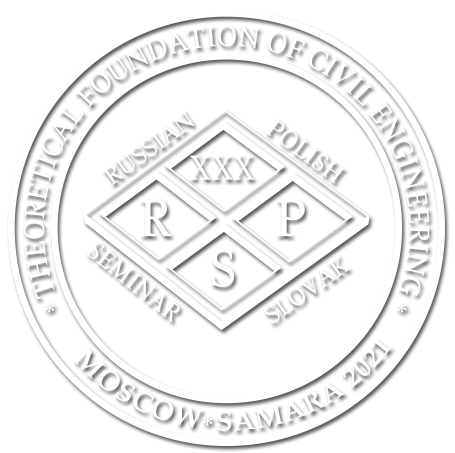13 - 18 SEPTEMBER, 2021, Moscow, SAMARA, RUSSIA
XXX Russian-Polish-Slovak Seminar
Theoretical Foundation of Civil Engineering
Theoretical Foundation of Civil Engineering
XXX Russian-Polish-Slovak Seminar
Theoretical Foundation of Civil Engineering
Dedicated to the 100th anniversary of Moscow State University of Civil Engineering
CONFERENCE TOPICS
Theoretical Foundation of Civil Engineering
Dedicated to the 100th anniversary of Moscow State University of Civil Engineering
CONFERENCE TOPICS
- Structural Mechanics
- Building Structures
- Geodesy and Geotechnics
- Building materials and Technologies in Construction
- Transport and Environmental Issues in Civil Engineering
CONFERENCE ORGANIZERS
Moscow State University of Civil Engineering
Address
Yaroslavskoye Shosse, 26, Moscow, Russia
Organisation Fee
€ 120 - for participation with the publication
Publication
All accepted papers of will be published in journal indexed in Scopus.
Moscow State University of Civil Engineering
Address
Yaroslavskoye Shosse, 26, Moscow, Russia
Organisation Fee
€ 120 - for participation with the publication
Publication
All accepted papers of will be published in journal indexed in Scopus.
The seminar is held within the framework of the "Year of Science and Technology" in the Russian Federation, as well as the celebration of the 100th anniversary of MISI-MGSU. The Seminar is co-organized by six universities from Russia, Poland and Slovakia:
- Moscow State University of Civil Engineering (National Research University)
- Wroclaw University of Science and Technology
- Warsaw University of Technology
- Don State Technical University
- University of Zilina
- Samara State Technical University
IMPORTANT DATES
31/05/2021
Deadline for paper submission
21/06/2021
Notification of acceptance
17/07/2021
Last fee payment
13 - 18/09/2021
Conference
INTERNATIONAL SCIENTIFIC COMMITTEE
MGSU
- Prof. Pavel Akimov, DSc
- Prof. Vladimir Andreev, DSc
- Prof. Zaven Ter-Martirosyan, DSc
- Prof. Tatiana Matseevich, DSc
- Prof. Oleg Mkrtychev, DSc
- Prof. Elena Korol, DSc
- Prof. Vladimir Mondrus, DSc
- Prof. Ashot Tamrazyan, DSc
WrUST
- Prof. Zbigniew Wójcicki
- Prof. Jan Biliszczuk
- Prof. Wojciech Glabisz
- Prof. Jerzy Hoła
- Prof. Wojciech Kostecki
- Prof. Ryszard Kutyłowski
- Prof. Dariusz Łydżba
- PhD Eng. Jacek Grosel
- PhD Eng. Monika Podwórna
UNIZA
- Prof. Ing. Ján Bujňák
- Prof. Ing. Libor Ižvolt
- Assoc. prof. Ing. Daniela Kucharová
- Assoc. prof. Ing. Janka Ižvoltová
- Assoc. prof. Mgr. Dana Sitanyiová
- Assoc. prof. Ing. Daniela Durčanská
- Prof. Ing. Ján Mikolaj
- Assoc. prof. Ing. Ján Rybárik
- Assoc. prof. Peter Koteš, PhD
- Assoc.prof. Mária Kudelčíková, PhD
DSTU
- Prof. Dmitriy Mailyan, DSc
- Dr. Gennadiy Verjbovskiy, DSc
- Prof. Grigoriy Nesvetaev, DSc
- Dr. Larisa Kirilchik, PhD
- Prof. Svetlana Sheina, DSc
SamGTU
- Prof. Natalia Chumachenko, DSc
- Prof. Dmitriy Shlyakhin, DSc
- Dr. Aleksey Solov'yev, PhD
- Dr. Sergey Yevdokimov, PhD
WUT
- Prof. Andrzej Garbacz
- Prof. Wojciech Gilewski
- Prof. Stanisław Jemioło
- Prof. Tomasz Lewiński
- Prof. Piotr Wojciechowski
- Prof. Artur Zbiciak
- Assoc. Prof. Magdalena Ataman
- Assoc. Prof. Marcin Gajewski
- Assoc. Prof. Nabi Ibadov
- Assoc. Prof. Michał Krzemiński
- Assoc. Prof. Monika Mitew-Czajewska
- Eng. Hubert Anysz, PhD
Other
- Prof. Mirzioyd Mirsaidov, DSc (TIIAME)
Guest Editor
- Prof. Nikolay Vatin, Dsc
ORGANIZING COMMITTEE
MGSU: Tusnin A.R., Galishnikova V.V., Kaitukov T.B., Nezhnikova E.V., Shtymov Z.M., Doroshenko A.V., Shvedov S.A., Belyakov S.I., Filatov V.V., Sokolova A.G., Kanhva V.S., Makisha N.A., Sergeev S.A., Aleksanin A.V., Molchanova I.P., Evstratov V.S., Vorobiev P.Yu.
SamSTU: Pishchulev A.A., Alpatov V. Yu., Panfilov D.A.
SCHEDULE
13/09/2021
MOSCOW STATE UNIVERSITY OF CIVIL ENGINEERING,
Hall of the Academic Council
10:00 - REGISTRATION & WELCOME COFFEE
11:00 - OPENING CEREMONY
11:30 - PLENAR SESSION
WUT: Adam Zawadzki.
Critical issues in designing controllable deployable tensegrity structures.
UNIZA: Daniel Papán.
The prediction of railway induced vibration effects on planned building.
WRUST: Zbigniew Wójcicki.
Method of Stabilization of Resonant Parametric Vibrations.
MGSU: Ashot Tamrazyan.
Seismic resistance of reinforced concrete structures of buildings after fire.
13:30 - LUNCH
Hall of the Academic Council
10:00 - REGISTRATION & WELCOME COFFEE
11:00 - OPENING CEREMONY
11:30 - PLENAR SESSION
WUT: Adam Zawadzki.
Critical issues in designing controllable deployable tensegrity structures.
UNIZA: Daniel Papán.
The prediction of railway induced vibration effects on planned building.
WRUST: Zbigniew Wójcicki.
Method of Stabilization of Resonant Parametric Vibrations.
MGSU: Ashot Tamrazyan.
Seismic resistance of reinforced concrete structures of buildings after fire.
13:30 - LUNCH
14/09/2021
FEE: €100
Includes:
Presentation of scientific research results;
admission to all conference sessions and workshops;
on-line access to Proceedings.
Presentation of scientific research results;
admission to all conference sessions and workshops;
on-line access to Proceedings.
All accepted submission will be published in journal indexed by: Scopus.
One person can be an author or a co-author in maximum two papers.
The number of pages for each paper - not less than 8, no more than 10.
The maximum amount of co-authors in one article - no more than 5.
TEMPLATES AND GUIDELINES
MS_Word_template
One person can be an author or a co-author in maximum two papers.
The number of pages for each paper - not less than 8, no more than 10.
The maximum amount of co-authors in one article - no more than 5.
TEMPLATES AND GUIDELINES
MS_Word_template
Please read first the detailed Publication ETHICS.
Please use the IMRAD model for structuring your work.
The following parts of the article are mandatory:
Title
It must include no more than seven words (excluding prepositions, conjunctions and articles).
The title should not contain verbs.
The title should not include such words as analysis, research, study, to the question, new, problems, questions, some, features, special, from the point of view, application, search, definition, modern, current, solution, best, most / least profitable, optimum, most etc.
Abstract
The abstract should be the presentation of the article without itself.
Abstract should have the same structure as the article and include problem urgency; purpose; methods; results; conclusions.
Abstract should be of 200-250 words.
Keywords
From 5 to 10 words or word combinations.
Introduction
This part should include the objectives of the work and its background. It should be based on the literature review. In the literature review you should show the competence in your area and its main authors and works. In the same time, you should not cite all possible references but only those that are strictly connected with your topic. The recommended quantity of references is 5-10.
Methods
This part should provide details of the experimental setup and the methods used for obtaining the results.
Results
This part should clearly and concisely present the data using figures and tables where appropriate.
Discussion
This part should describe the relationships and generalizations shown by the results and discuss the significance of the results making comparisons with previously published work.
Conclusions
Here the list of main conclusions is given. It should not repeat the results, but the generalization is intended.
Acknowledgements
The personal acknowledgements and also the information about funding is given here.
References
It is important to remember that the list of references is one of the most important parts of the article. You should show the competence in your area and its main authors and works. In the same time, you should not cite all possible references but only those that are strictly connected with your topic.
The recommended quantity of references is 20.
The cited papers should be relatively recent, actual and easy of access. It is advisable that the papers are accessible through Internet.
You should cite publications in the text with number in the list enclosed in square brackets. A list of references in the order of mention should be supplied.
Please use the IMRAD model for structuring your work.
The following parts of the article are mandatory:
Title
It must include no more than seven words (excluding prepositions, conjunctions and articles).
The title should not contain verbs.
The title should not include such words as analysis, research, study, to the question, new, problems, questions, some, features, special, from the point of view, application, search, definition, modern, current, solution, best, most / least profitable, optimum, most etc.
Abstract
The abstract should be the presentation of the article without itself.
Abstract should have the same structure as the article and include problem urgency; purpose; methods; results; conclusions.
Abstract should be of 200-250 words.
Keywords
From 5 to 10 words or word combinations.
Introduction
This part should include the objectives of the work and its background. It should be based on the literature review. In the literature review you should show the competence in your area and its main authors and works. In the same time, you should not cite all possible references but only those that are strictly connected with your topic. The recommended quantity of references is 5-10.
Methods
This part should provide details of the experimental setup and the methods used for obtaining the results.
Results
This part should clearly and concisely present the data using figures and tables where appropriate.
Discussion
This part should describe the relationships and generalizations shown by the results and discuss the significance of the results making comparisons with previously published work.
Conclusions
Here the list of main conclusions is given. It should not repeat the results, but the generalization is intended.
Acknowledgements
The personal acknowledgements and also the information about funding is given here.
References
It is important to remember that the list of references is one of the most important parts of the article. You should show the competence in your area and its main authors and works. In the same time, you should not cite all possible references but only those that are strictly connected with your topic.
The recommended quantity of references is 20.
The cited papers should be relatively recent, actual and easy of access. It is advisable that the papers are accessible through Internet.
You should cite publications in the text with number in the list enclosed in square brackets. A list of references in the order of mention should be supplied.
LAST PROCEEDINGS
IOP Conference Series: Materials Science and Engineering, Vol. 1015
IOP Conference Series: Materials Science and Engineering, Vol. 661
MATEC Web of Conferences, Vol. 196
MATEC Web of Conferences, Volume 117
Procedia Engineering, Volume 153, Pages 1-944
Procedia Engineering, Volume 111, Pages 1-906
Procedia Engineering, Volume 91, Pages 1-492
CONFERENCE PARTNERS








VENUE
Moscow State University of Civil Engineering
26, Yaroslavskoye Sh., Moscow, Russia, 129337
26, Yaroslavskoye Sh., Moscow, Russia, 129337
CONTACTS
E-MAIL
science@mgsu.ru
Address
129337, 26, Yaroslavskoye Shosse, Moscow, Russia
ATTN: Scientific Policy Department
ATTN: Scientific Policy Department
© RUSSIAN-POLISH-SLOVAK SEMINAR 2021
Theoretical Foundation of Civil Engineering
Theoretical Foundation of Civil Engineering
